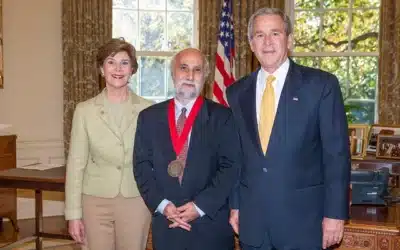Libertarians embrace civil liberties more than liberals, markets more than conservatives, and freedom more than just about anyone.
Yet they can’t get elected to public office in meaningful numbers. It’s the same with independents.
It’s not as if getting elected is that difficult. After all, one does not have to be a genius or principled, as evidenced by most of Congress.
Moreover, unlike most other mammal species, a politician doesn’t have to be the biggest, strongest, and hairiest alpha male to boss others around, although Hillary Clinton comes close. Nor does a modern American politician have to wield a sword like Attila the Hun, spear a lion like a Zulu warrior, roast an enemy alive like a Comanche chieftain, starve tens of millions of innocent peasants like Stalin and Mao, or poison enemies like Putin.
A successful politician has to excel in one area, however: understanding human nature. Such master politicians as Ronald Reagan, Bill Clinton and Barack Obama were better at this than Sigmund Freud.
Sure, it helps to be amoral, to have a gift of gab, to be charismatic, and to have a lust for power. But these traits are secondary to understanding human nature.
The following five-question test will show how well you understand human nature and thus how suited you are to be a politician.
Question 1: Recently, a magazine at a supermarket checkout stand had a cover story about women who “have changed the world.” Which women do you think were spotlighted?
- Cleopatra, Queen Elizabeth, Madam Curry, Emilia Earhart, Golda Meier, Rosa Parks, Margaret Thatcher, and others like them.
- Oprah Winfrey, Ellen DeGeneres, and others of this ilk.
The correct answer is “2.”
I’m absolutely clueless about what people see in Oprah Winfrey and Ellen DeGeneres, but they trigger some inexplicable human emotion that has nothing to do with reason or logic.
The point for a political wannabe is not to understand the emotion but to emulate the behavior that triggers the emotion. In other words, if you want to be popular with the voting public, be like Oprah and Ellen.
Question 2: Putting aside their politics, which of the following two women should you emulate if you want to be popular with the electorate? (This is a follow-up to the first question, to see if you’re learning anything.)
- Condoleezza Rice, who is one of the brightest, learned, accomplished, and most interesting women on the planet—and to top it off, she is a black woman who rose from very humble roots.
- Princess Di, who was born with a silver spoon between her brilliant white teeth, who married into royalty, who was a party girl, who posed with sickly children at staged events, and who spent taxpayer money on charities of dubious value.
You’re on a roll now. Since you’re quick on the uptake, you no doubt know that “2” is the right answer.
But do you know why Princess Di was one of the most beloved people in modern history? It was human nature in operation. She played to the plebian need for attention from a caring, empathetic socialite from a superior caste, and the plebeians gave her what she craved in return: adoration. There is a direct evolutionary line that runs from this modern-day codependency to chimpanzees grooming their alpha male in return for his attention and protection.
Speaking of chimpanzees, it’s easy to identify libertarian-minded chimps at the monkey enclosure at the local zoo. They’re the ones who refuse to groom the alpha male. Instead, they sneak off into the bushes to mate with the alpha male’s girlfriends behind his back. It’s not a bad life, but they will never become the alpha male.
Question 3: Imagine someone who wants to run for political office and is a self-employed professional who charges an hourly rate of $100 for his services. Which of the following acts of charity should he choose?
- Work an extra hour and donate the earnings of $100 to a worthy cause that has the expertise to put the money to good use.
- Serve soup to the homeless in a soup kitchen for an hour.
The first choice will benefit the poor more than the second choice, because it is based on the economic concepts of specialization and division of labor; that is, the wannabe politician can generate more money for the poor by doing what he does best instead of serving soup.
But “1” is the wrong choice for a politician. Serving soup is the right choice, especially if done in front of TV cameras. That’s because a large segment of the electorate wants politicians who demonstrate empathy and caring, whether or not they do any actual good.
In general, libertarians don’t care if politicians are empathetic and caring. They just want politicians who restrict themselves to protecting life, civil liberties and property rights. As candidates, then, they make the mistake of thinking that everyone thinks as they do.
To summarize the learning so far, if you want to be elected to public office, you need to serve soup in a soup kitchen while mimicking Princess Di, Oprah Winfrey, and Ellen DeGeneres.
Question 4: It’s undeniable that the ballooning cost of public-sector union featherbedding and pensions is bankrupting municipalities and states. This is especially so for unionized teachers, cops and firefighters. If you were to run for political office, what would you propose doing about this?
- Set the pay and benefits (and job security) for public-sector workers at the average for comparable jobs in private industry.
- Work to repeal President Kennedy’s Executive Order 10988 of 1962 and Congress’s Civil Reform Act of 1978, both of which allowed federal workers to unionize, which in turn encouraged the states to allow the same—and both of which set up a lose-lose for taxpayers, who foot the bill but aren’t the ones bargaining with the unions.
- Give the workers more money and richer pensions.
You know that “3” is the right answer. It’s the right answer because the more that teachers are paid, the better education that children receive. Moreover, all cops and firefighters are heroes and hold the most dangerous jobs in America.
That none of this is true doesn’t matter. What matters is that most voters think it’s true.
Then there is an emotional issue that would smack of sexism and be politically incorrect if I were to mention it . . . so I’ll mention it: Even the most ardent feminists probably fantasize about burly, muscular, clean-cut guys in uniforms carrying them off over their shoulders.
Remember: Humans are predominately social and emotional, not intellectual. Tailor your campaign messages accordingly.
Question 5: What is the primary human emotion behind the support for progressive taxes and income redistribution, and for the entitlements and hundreds of different welfare programs that are bankrupting the country?
- A desire for fairness.
- A desire for social justice.
- Envy.
Correct answer: envy. People are envious of those who have more than they do, unless the well-off come across as Princess Di, Oprah, and Ellen.
Play to the envy and you can’t lose.
In closing, let me summarize what you and other libertarians should do to be elected: Be like Princess Di, Oprah and Ellen; serve soup in a soup kitchen; give more money and richer pensions to teachers, cops and firefighters; tailor your messages to people’s emotions and social needs instead of their intellects; and play to the primary human emotion of envy.
The only problem with this is that you will no longer be a libertarian. You’ll be a Democrat or Republican.






























